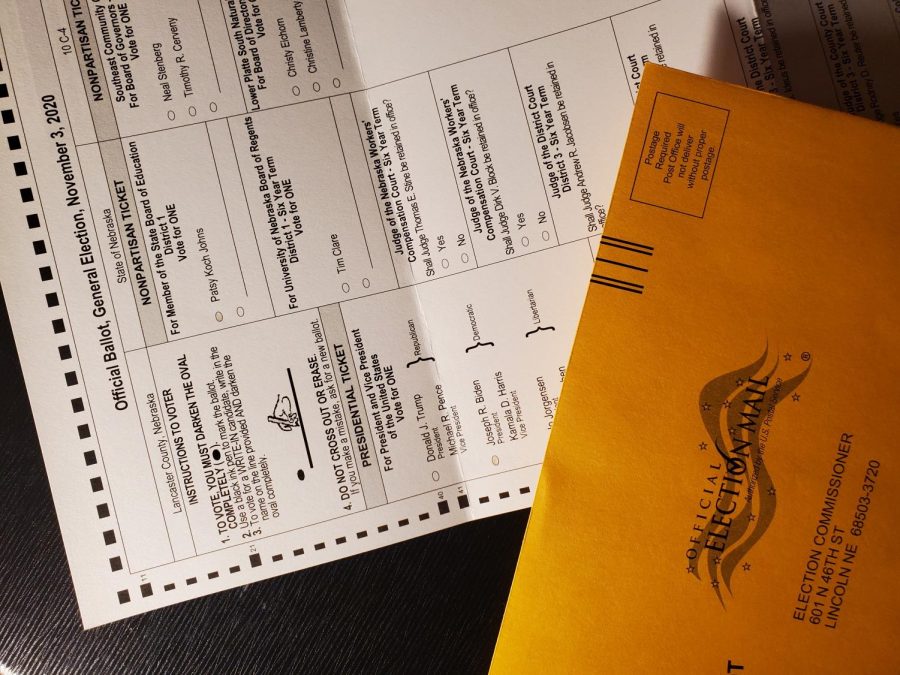A closer look at coronavirus and the election
More specifics about how the coronavirus is affecting Election Day 2020
Photo by Julia Ehlers
In the middle of the coronavirus pandemic and a major election year, many voters are opting to request absentee ballots instead of voting in person on November 3.
Now you know the basics of voting (or if you don’t, check out this story), let’s talk about some of the more complicated aspects of this year’s election. There’s a lot of rumors flying, and contradictions between news outlets and government officials and what people hear from each other. From voter fraud, to when the election results might come out, here are some answers about how coronavirus is affecting the 2020 general election.
Should I be worried about voting in person with the coronavirus?
There’s an element of risk to going out to vote with the coronavirus pandemic still spreading across the country. But according to Lancaster County Election Commissioner David Shively, the county’s election staff are doing everything possible to make it safe to vote in person.
“We are taking precautions at our polling sites that should keep things safe there for people,” he says. “As long as they’re wearing a mask, and since things are going to be sanitized throughout the day, I think they could be comfortable going to their polling place.”
With all of the absentee voting, will the results of the election be delayed in coming out?
Another concern with the absentee voting is how it affects everyone’s ability to know the outcome of the election on November 3. This shouldn’t be a huge issue in Lancaster, as long as none of the races in the county are too close.
“We always have some ballots that arrive at the last minute on election day that may not be able to be tallied on election night, because we have to go through the process of checking them in and getting them opened and approved and everything,” Shively said. “We do a really good job here in Lancaster County of getting almost everything that has been returned to us open and ready to be counted by election night. There could be a few hundred ballots not counted on election night, but I don’t think it will be a substantial amount.”
On a national scale, however, there is a good chance that we won’t know who won the election until days, or even weeks after November 3. According to the Wall Street Journal, mail-in ballots can take longer to count than in person ballots, due to different verification processes required. Not all states have the staff to keep up with the ballots that come in towards the end of the deadlines to be counted.
This was shown to be the case during the primaries last spring. Depending on the state’s voting set up, and when the primary election was held, the votes were all counted anywhere between a few hours to 10.5 days after the polls closed, and released even later. It all just depends on how many absentee ballots are used, how many are sent in towards the end of the deadline, and how close the elections are. If you want a closer look at what happened during the primaries, this Washington Post article does a good job of breaking it all down.
What’s being done to prevent voter fraud during COVID-19?
There’s a lot of concern about voter fraud and the reliability of an election made up of an unusually high concencentration of absentee ballots. Absentee voting has been around since the Civil War, when soldiers used mail-in ballots to send their votes for president in the 1864 election back to their states, so it’s a time-tested, reliable way to make your voice heard.
Lancaster County also has a good record where voter fraud is concerned. “We’ve never had a case of voter fraud with early voting that’s ever been prosecuted or even been investigated in Nebraska, or in Lancaster County,” Dave Shively said. “We’re very cautious about verifying signatures on every single absentee ballot that comes back. … If a signature does raise a flag, we’d reach out to that voter and see if maybe they have changed their signature. But everyone has to sign their valid envelope when it comes back. If it’s not signed, … we won’t be able to count that ballot.”
What are the best ways to research candidates?
Michaela Schleicher, a social studies teacher at East, recommends the Lincoln Journal Star’s voter’s guide. They publish sample ballots along with explanations of any referendums and initiatives.
“Otherwise, if you’re going to get your information about the different candidates, particularly for the national piece, I would highly recommend that you don’t just choose a one sided source,” Schleicher said. “No matter what national news source you’re going to use right now, it’s going to be fairly one sided. So if you’re going to choose a CNN, to get information on the candidates you need to counteract that with a Fox News, just so you’re getting a broader picture from both angles.”
Why is it important that I go out and vote?
We’ve all heard how important it is to vote throughout our education. But only about half the population votes in presidential elections, and less than that in local elections, so why is it so important to vote?
“It’s your easiest way to really let your government and your government officials know if you’re happy or satisfied with what they’ve been up to,” Schleicher said. “So, if you complain but you don’t take the time to vote, then you haven’t taken advantage of your civic responsibility in this country, which is to be an active, informed citizen. It’s your ability to tell your national, your state, your local government if you’re happy with what they’re doing. If you don’t vote them back in, that’s telling them that you’re dissatisfied with what they’re doing. It’s your voice.”

My name is Julia Ehlers, and I’m a senior here at Lincoln East. This is my second year on the Oracle Staff, and I’m looking forward to another great...



